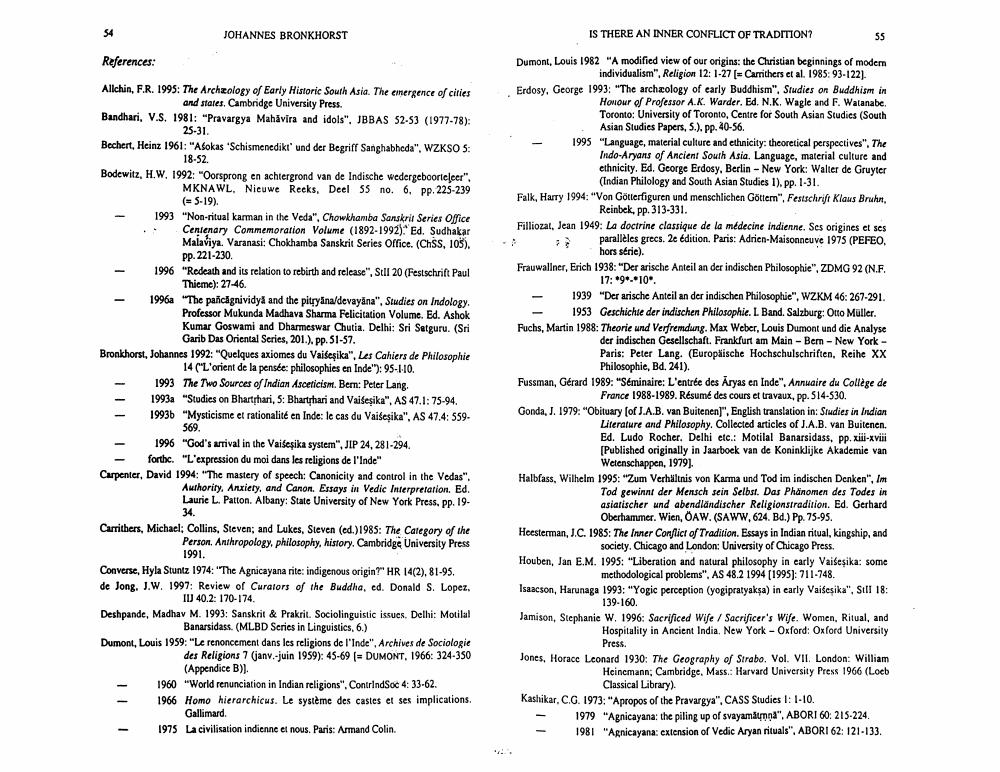________________
JOHANNES BRONKHORST
IS THERE AN INNER CONFLICT OF TRADITION?
References:
-
Allchin, F.R. 1995: The Archeology of Early Historic South Asia. The emergence of cities
and states. Cambridge University Press. Bandhari, V.S. 1981: "Pravargya Mahāvīra and idols". JBBAS 52-53 (1977-78):
25-31. Bechert, Heinz 1961: "Asokas 'Schismenedikt und der Begriff Sanghabhcda", WZKSO 5:
18-52. Bodewitz, HW, 1992: "Oorsprong en achtergrond van de Indische wedergeboorteseer".
MKNAWL. Nieuwe Recks, Deel 55 no. 6, pp. 225-239
(= 5-19). - 1993 "Non-ritual karman in the Veda", Chowkhamba Sanskrit Series Office
Centenary Commemoration Volume (1892-1992) Ed. Sudhakar Malaviya. Varanasi: Chokhamba Sanskrit Series Office. (CHSS, 105).
pp. 221-230. 1996 "Redeath and its relation to rebirth and release". Stll 20 (Festschrift Paul
Thieme): 27-46. - 1996a "The pancagnividya and the pitryana/devayana". Studies on Indology.
Professor Mukunda Madhava Sharma Felicitation Volume. Ed. Ashok Kumar Goswami and Dharmeswar Chutia. Delhi: Sri Setguru. (Sri
Garib Das Oriental Series, 201.). pp. 51-57. Bronkhorst, Johannes 1992: "Quelques axiomes du Vaisesika", Les Cahiers de Philosophie
14 ("L'orient de la pensée: philosophies en Inde"): 95-110. 1993 The Two Sources of Indian Asceticism. Bern: Peter Lang. 1993a "Studies on Bharthari, 5: Bharthari and Vaiseşika", AS 47.1: 75-94. 1993b "Mysticisme et rationalité en Inde: le cas du Vaisesika", AS 47.4: 559.
569.
1996 "God's arrival in the Vaibesika system", JIP 24, 281-294. - forthc. "L'expression du moi dans les religions de l'Inde" Carpenter, David 1994: "The mastery of speech: Canonicity and control in the Vedas".
Authority, Anxiety, and Canon. Essays in Vedic Interpretation. Ed. Laurie L. Patton. Albany: State University of New York Press, pp. 19
34. Carrithers, Michael; Collins, Steven; and Lukes, Steven (ed.) 1985: The Category of the
Person, Anthropology, philosophy, history. Cambridge University Press
1991. Converse, Hyla Stuntz 1974: "The Agnicayana rite: indigenous origin?" HR 14(2), 81-95. de Jong, JW, 1997: Review of Curators of the Buddha, ed. Donald S. Lopez,
IIJ 40.2: 170-174. Deshpande, Madhav M. 1993: Sanskrit & Prakrit. Sociolinguistic issues. Delhi: Motilal
Banarsidass. (MLBD Scries in Linguistics, 6.) Dumont, Louis 1959: "Le renoncement dans les religions de l'Inde". Archives de Sociologie
des Religions 7 (janv.-juin 1959): 45-69 (= DUMONT, 1966: 324-350
(Appendice B) 1960 "World renunciation in Indian religions". ContrindSoc 4: 33-62. 1966 Homo hierarchicus. Le système des castes et ses implications
Gallimard. 1975 La civilisation indienne et nous. Paris: Armand Colin.
Dumont. Louis 1982 "A modified view of our origins: the Christian beginnings of modem
individualism", Religion 12:1-27 [= Carrithers et al. 1985: 93-122). Erdosy, George 1993: "The archæology of early Buddhism", Studies on Buddhism in
Honour of Professor A.K. Warder. Ed. N.K. Wagle and F. Watanabe Toronto: University of Toronto, Centre for South Asian Studies (South
Asian Studies Papers, 5.). pp. 40-56. - 1995 "Language, material culture and ethnicity: theoretical perspectives". The
Indo-Aryans of Ancient South Asia. Language, material culture and ethnicity. Ed. George Erdosy, Berlin - New York: Walter de Gruyter
(Indian Philology and South Asian Studies 1), pp. 1-31. Falk, Harry 1994: "Von Götterfiguren und menschlichen Göttem". Festschrift Klaus Bruhn
Reinbek, pp. 313-331. Filliozat, Jean 1949: La doctrine classique de la médecine indienne. Ses origines et ses
paralleles grecs. Zc edition. Paris: Adrien-Maisonneuve 1975 (PEFEO,
hors série). Frauwallner, Erich 1938: "Der arische Anteil an der indischen Philosophie", ZDMG 92 (N.F.
17: 9*-*10* - 1939 "Der arische Anteil an der indischen Philosophie", WZKM 46:267-291.
1953 Geschichte der indischen Philosophie. L. Band. Salzburg: Outo Muller. Fuchs, Martin 1988: Theorie und Verfremdung. Max Weber, Louis Dumont und die Analyse
der indischen Gesellschaft. Frankfurt am Main - Bem - New York - Paris: Peter Lang. (Europäische Hochschulschriften, Reihe XX
Philosophie, Bd. 241). Fussman, Gérard 1989: "Séminaire: L'entrée des Aryas en Inde". Annuaire du Collège de
France 1988-1989. Résumé des cours et travaux, pp. 514-530. Gonda, J. 1979:"Obituary fof J.A.B. van Buitenen)". English translation in: Studies in Indian
Literature and Philosophy. Collected articles of J.A.B. van Buitenen. Ed. Ludo Rocher, Delhi etc.: Motilal Banarsidass. pp. xiii-xviii (Published originally in Jaarboek van de Koninklijke Akademie van
Wetenschappen, 1979). Halblass, Wilhelm 1995: "Zum Verhältnis von Karma und Tod im indischen Denken". Im
Tod gewinnt der Mensch sein Selbst. Das Phänomen des Todes in asiatischer und abendländischer Religionsfradition. Ed. Gerhard
Oberhammer. Wien, OAW. (SAWW.624. Bd.) Pp. 75-95. Heesterman, J.C. 1985: The Inner Conflict of Tradition. Essays in Indian ritual, kingship, and
society. Chicago and London: University of Chicago Press. Houben, Jan E.M. 1995: "Liberation and natural philosophy in early Vaibesika: some
methodological problems". AS 48.2 1994 (1995): 711-748. Isaacson, Harunaga 1993: "Yogic perception (yogipratyaksa) in early Vai esika", Sill 18:
139-160. Jamison, Stephanie W. 1996: Sacrificed Wife / Sacrificer's Wife. Women, Ritual, and
Hospitality in Ancient India, New York - Oxford: Oxford University
Press. Joncs, Horace Leonard 1930: The Geography of Strabo. Vol. VII London: William
Heinemann: Cambridge, Mass.: Harvard University Press 1966 (Locb
Classical Library) Kashikar. C.G. 1973:"Apropos of the Pravargya". CASS Studies I: 1-10.
1979 "Agnicayana: the piling up of svayamauna", ABORI 60:215-224. 1981 "Agnicayana: extension of Vedic Aryan rituals". ABORI 62: 121-133.




